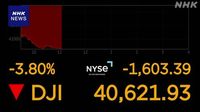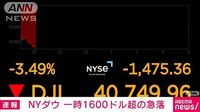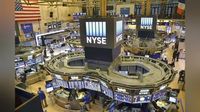On April 3, 2025, the New York stock market experienced a dramatic downturn, with the Dow Jones Industrial Average plummeting over 1600 dollars shortly after trading began. This sharp decline followed the announcement from the Trump administration regarding new reciprocal tariffs, which raised concerns about a potential global trade war and its implications for the U.S. economy.
The Dow's drop was a stark indicator of investor anxiety, as fears mounted that the tariffs would escalate tensions in international trade, adversely affecting corporate earnings and economic stability in the United States. Many investors responded by selling off stocks, leading to a widespread market retreat. The NASDAQ Composite Index, known for its concentration of high-tech stocks, also fell sharply, experiencing a decline of more than 5%.
According to market analysts, the reciprocal tariffs announced by President Trump were more severe than anticipated, prompting a swift reaction from investors. The tariffs are expected to increase the costs of imported goods, reigniting inflationary pressures and potentially pushing the U.S. economy toward a recession. "The U.S. economy has been performing well until now, but there are growing concerns that trade friction with various countries will lead to a slowdown," said a market source.
As the trading day progressed, the Dow's decline was not just a fleeting moment; it marked the largest drop during trading hours this year. Major companies felt the brunt of this market shift. Apple, a leading smartphone manufacturer, saw its stock price decrease by approximately 10%, while sportswear giant Nike faced a 14% drop. The automobile sector was also hit hard, with General Motors (GM) shares falling by 3%. This decline came on the heels of the Trump administration's implementation of a 25% additional tariff on imported cars, further exacerbating the situation.
The ramifications of the tariff policy extend beyond immediate stock market reactions. Economy, Trade and Industry Minister Muto stated on April 3 that the Japanese government would ease the requirements for utilizing safety net loans in response to the tariffs. This move aims to cushion the impact on businesses affected by the new trade measures.
Adding to the economic concerns, the yen exchange rate rose to levels not seen in six months, reaching 145 yen per dollar. By the end of the day, it had climbed even higher, surpassing 146 yen per dollar. This fluctuation in currency rates reflects the ongoing volatility in the market and the uncertainty surrounding U.S.-Japan trade relations.
In a further development, Prime Minister Ishiba is set to meet with opposition leaders on April 4 to discuss the implications of the U.S. tariffs. This meeting comes as the government grapples with the fallout from the Trump administration's aggressive trade policies. Ishiba has instructed relevant ministers to thoroughly assess the impact of the tariff measures and to prepare comprehensive support strategies, including financial assistance for affected sectors.
The recent trade tensions have not only drawn attention from U.S. markets but have also prompted international reactions. The Chinese government announced that it would implement countermeasures against the U.S. tariffs, signaling a potential escalation in the ongoing trade conflict. On the same day, the Chinese military held consultations with U.S. military officials in Shanghai regarding maritime safety, highlighting the complex interplay of trade and diplomatic relations between the two nations.
In the midst of these economic challenges, the U.S. trade deficit saw a slight improvement, decreasing by 6.1% in February to 122.7 billion dollars. However, the overall sentiment in the market remains cautious as investors weigh the potential long-term effects of the new tariffs against the backdrop of a fragile global economy.
As the situation unfolds, stakeholders across various sectors are bracing for the impacts of the tariffs. The agricultural sector, in particular, is under scrutiny, with Agriculture and Forestry Minister Eto publicly questioning the U.S. claim that Japan imposes a 700% tariff on rice imports, stating that such a figure does not hold up to logical scrutiny.
In summary, the events of April 3, 2025, have underscored the fragility of the current economic climate, with the stock market reacting sharply to the Trump administration's tariff announcements. As discussions continue among government officials and market analysts, the path forward remains uncertain, with many watching closely for signs of recovery or further decline.








